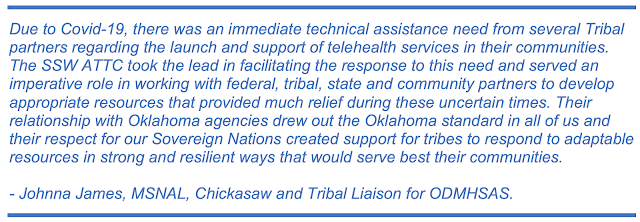Maureen Nichols
Director, South Southwest Addiction Technology Transfer Center
HHS Region 6
The recent COVID-19 health pandemic has accelerated the implementation of behavioral health services via remote technology, including telephone and video conferencing. In March 2020, as behavioral health treatment and recovery organizations prepared to continue critical services while implementing social distancing guidelines needed to keep patients and staff safe and healthy, many turned to the use of technology as a solution, including video conferencing and telephone services. For organizational leadership, decisions around critical issues such as compliance with laws and best practices related to patient confidentiality and protection, choice of platforms, licensing and certification regulations for practitioners, and costs and reimbursement procedures, had to be made at an accelerated rate. Federal and state agencies began issuing guidance related to relaxation of enforcement of privacy protections in a limited way due to the short-term health crisis, and funders addressed modifications to reimbursement policies to include telehealth services. However, much of the guidance was necessarily high level, leaving leadership of individual behavioral health programs to assess the fiscal and practical ramifications of responding to the new service landscape via the use of telehealth in the both the short and long term.
Over the past several years, the South Southwest Addiction Technology Transfer Center, in partnership with National Frontier and Rural Telehealth Education Center (NFARtec), has been offering training and technical assistance to states, tribal communities and behavioral health organizations and practitioners as part of its telehealth initiative. This includes documenting best practices and real world examples of implementation, such as the Oklahoma Department of Mental Health and Substance Abuse Services (ODMHSAS) successful initiative to increase the uptake of telehealth technologies to deliver assessment, treatment and recovery services in their public health system. It also includes offering behavioral health clinicians and peer support specialists learning collaborative opportunities to build and practice their videoconferencing skills and receive coaching and feedback from experienced behavioral health telehealth practitioners.
At the start of the response to the pandemic, South Southwest ATTC began receiving multiple requests from organizations across the region for immediate guidance on how to translate many of the strategies for remote technology on the ground in a rapid and timely manner. SSW ATTC facilitated regional dialogues between state and local behavioral health organizations with telehealth experience and organizations new to the use of remote technology, including an event in Oklahoma with tribal communities, experienced behavioral health providers and ODMHSAS. Through those discussions, it became apparent that concrete guidance on practical steps for organizations to take in order to implement remote technology was needed. As a result, SSW ATTC developed the Framework for Implementation of Telehealth Services in a Behavioral Health Setting in a Short Time Frame, which covers topics that include:
- Determining participant interest and capacity for use of technology
- Selection of technology platforms
- Patient safety and privacy considerations
- Staff support and training
- Review of internal policy and procedures
- Adapting work flows
- Fiscal considerations and reimbursements
This guide is one piece of a regional and national TTC network partnership designed to provide resources and support to the behavioral health field to ensure services to individuals in our community are accessible, evidence based and culturally responsive during the current challenging health crisis and beyond. Additional resources from the TTC network are available at attcnetwork.org, mhttcnetwork.org and pttcnetwork.org. To access regional assistance from the South Southwest Addiction Technology Transfer Center, please contact us via website or email.



No comments:
Post a Comment